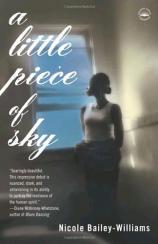Reading Group Guide
Discussion Questions
A Little Piece of Sky

1. In the first chapter, what does the kite represent to Song's mother? Has its meaning changed when it reappears near the end of the book, in the chapter called "In My Dream"? Why is the kite the color of water?
2. Song spends most of her life believing that she was responsible for her mother's death. As painful as that belief is, does it also help Song cope in some way? Why is it so difficult for her to let go of the notion that she caused her mother's shooting? Why is it significant that Song gave her sister the gun in an attempt to be helpful (thereby gaining Caramia's love)?
3. In "A Happy Day," Song and her neighbor, Miss Olga, delight in simple pleasures such as going to the mercado and planting seeds. Was there a Miss Olga in your childhood–a special adult who served as confidante and comforter? Do you fill that role for any young people?
4. Discuss Philadelphia as an ironic choice of residence for Song's mother. Why did she stop running there? Do the novel's characters find liberty or brotherly love in their part of the city?
5. At the height of her career achievements, Song is still haunted by the emotional injuries of her past. How does this trauma play out in her life? What does it take for her to become more accepting of herself?
6. Like many women in her situation, Song feels ashamed of the very therapy that will help her feel less shameful. She won't even allow any insurance claims to be filed, for fear that someone will find out she's seeking help. Why does therapy still carry a stigma for some?
7. Miss Olga's Ocho Orders say a lot about her unique life experiences. Drawing on your past, what pearls of wisdom would you add to the list?
8. How does Linda's story affect Song? What kept Song from falling into a deadly relationship as well?
9. In "Healing IV," Song says, "I just struggle with the straddle," referring to the clash between her poverty-stricken past and the affluent circles she encounters as a fund raiser. In "Return to the Judge's House," she says that the party made her feel "as if I had just walked into the vortex of a vanilla cyclone." What do these uncomfortable roles say about the definition of "success"? What effect do they have on Song's self-confidence? Where does Song not feel alienated?
10. Exploring imagery and tone, what transformation do you see from morning to noon, and from noon to night?
11. In spite of her early attempts to change her physical appearance (through hair relaxers that aren't very relaxing, for example), Song manages to maintain a perception of her inner self as beautiful. What keeps that tiny part of herself from succumbing to the sadness around her? Why do you suppose Nicole Bailey-Williams chose curvature of the spine as one of Song's burdens?
12. In "Mi Padre," Song's father quotes her mother: "I ain't got nothin' left to give. I gave my love. I have my heart. All I got left is my song." How does this affect your perception of Song's mother at that point? How does that scene compare to the chapter entitled "My Birth"?
13. The structure of A Little Piece of Sky is unusual; brief chapters, all conveyed in first person, alternating between past tense and present. How do these devices affect the storytelling? At any point did you forget that the book is a work of fiction?
14. In "My Inner Self," Song refers to the night sky seen by her ancestors through cracks in the ship that heaved them across the ocean. She too kept her eye on the sky during the terrifying hours she spent locked in the bathroom. In what other ways does Song's life story mirror African American history?
A Little Piece of Sky
- Publication Date: October 8, 2002
- Paperback: 176 pages
- Publisher: Broadway
- ISBN-10: 0767912160
- ISBN-13: 9780767912167







